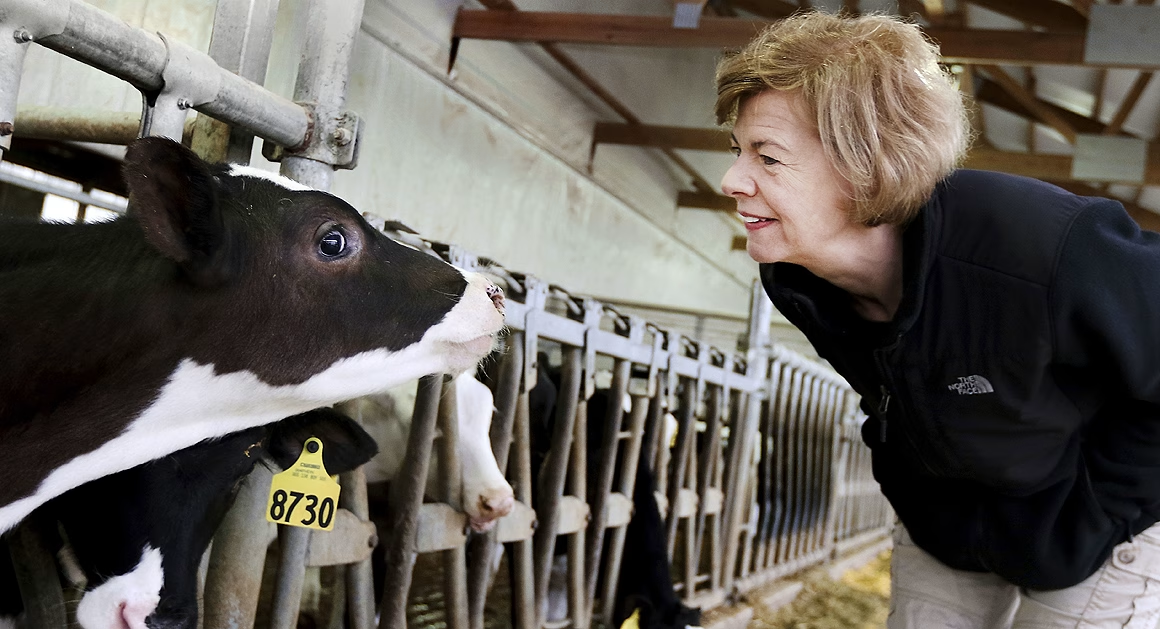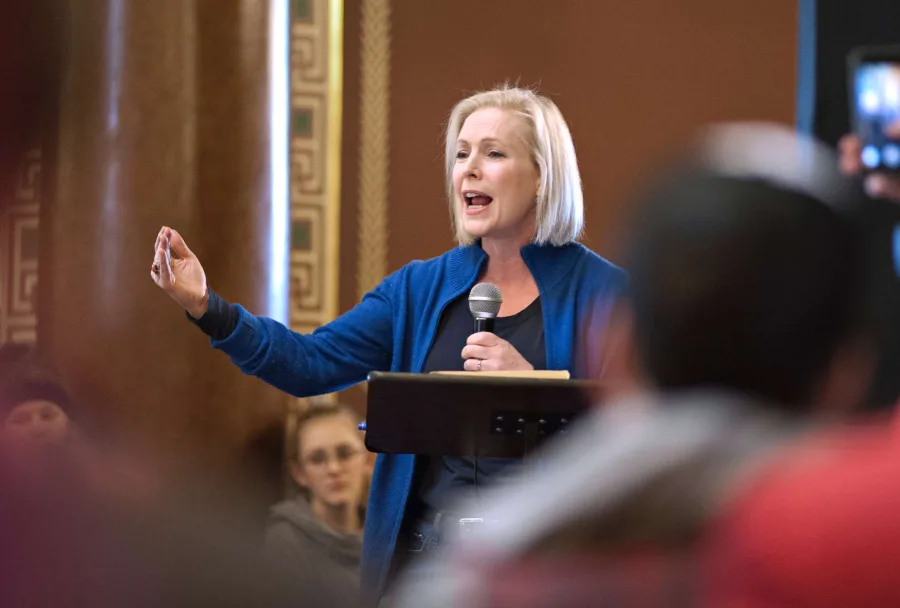Why are Wisconsin dairy farmers criticizing Senator Tammy Baldwin’s policies and praising Trump’s support? Are Baldwin’s promises enough to win their votes?
Summary: As the tight Senate race in Wisconsin unfolds, Democratic Senator Tammy Baldwin’s appeals to dairy farmers are being scrutinized. Renowned Wisconsin dairy farmers Jim Jenks and David Trimner criticize Baldwin’s track record and campaign promises, arguing they fall short compared to former President Donald Trump’s management. Although Baldwin touts efforts like emergency mental health care funding, these farmers raise concerns about overregulation and inflation under Democratic policies. Suggesting that a Republican alternative may offer more stability for the dairy industry, Jenks and Trimner emphasize the importance of voter turnout among fellow Wisconsinites.
- Wisconsin Senate race tightens with Democratic Senator Tammy Baldwin’s efforts to win over dairy farmers under scrutiny.
- Dairy farmers Jim Jenks and David Trimner are critical of Baldwin’s policies, highlighting overregulation and inflation concerns.
- These farmers argue that former President Donald Trump provided better support to the dairy industry during his tenure.
- Jenks and Trimner emphasize voter turnout’s importance in electing a candidate who supports the dairy industry.

Wisconsin’s dairy sector, often called ‘America’s Dairyland,’ is critical as we approach a pivotal Senate campaign. The stakes for our state’s dairy farmers could not be higher. Many dairymen in Wisconsin are dissatisfied with Democratic Senator Tammy Baldwin, questioning her commitment to their livelihoods. In contrast, they commend former President Donald Trump for initiatives that provided crucial support during one of the industry’s most challenging periods. David Trimner, Co-owner of Miltrim Farms, articulates his concerns: “Everything she’s going to bring as a Democrat, voting for all of their programs. So, we discuss overregulation. Dairy farms are among the most heavily regulated sectors. With so much at risk, this Senate election is not just about politics; it’s about the immediate future of Wisconsin’s dairy industry and the men and women who sustain it.
Wisconsin Senate Race: Farmers Pinned in the Political Crossfire
The Wisconsin Senate race is heating up, with Democratic incumbent Tammy Baldwin facing a tough reelection battle against Republican challenger Eric Hovde. Both candidates are fighting to support Wisconsin’s strong dairy farming industry, which has a significant economic influence on the state. The stakes are enormous; dairy farms are more than companies; they are the lifeblood of many Wisconsin communities, creating employment and supporting local economies.
Senator Baldwin recently attempted to attract dairy producers by making grandiose promises. During a LaborFest address in Milwaukee, she promised to have their “backs.” She emphasized her work to win emergency mental health funding. However, other farmers like Jim Jenks and David Trimner feel that Baldwin’s plans fail to address the dairy industry’s genuine, urgent challenges. They argue that overregulation and inflation under the present government affect their livelihoods, comparing Baldwin’s attitude with the assistance they received under President Trump.
Jim Jenks Calls Out Senator Baldwin’s ‘Coattail’ Strategy
Jim Jenks, the owner of Jenks Jerseys Dairy Farm, has expressed dissatisfaction with Senator Tammy Baldwin’s policies, calling them “extremely unappealing” to dairymen. During a “Fox & Friends First” program, Jenks questioned Baldwin’s well-known emergency mental health care funding bill, which she co-sponsored with Republican Marsha Blackburn. He remarked, “In 2020, she and Republican Marsha Blackburn provided some funding for emergency mental health care for dairy farmers.” I’m not personally aware of anybody who has profited from it. Still, she’s riding that coattail into the dairy farm community to attempt to get her support back.”
Jenks is especially suspicious of the usefulness of this money, claiming that it has had no discernible influence on farms like his. He views Baldwin’s ideas as efforts to gain political momentum rather than genuine solutions for the dairy industry. According to Jenks, this form of political maneuvering sharply contrasts the Trump administration’s assistance during the problematic outbreak.
Donald Trump did an incredible job toward the conclusion of COVID-19 by assisting dairymen in riding the ship sinking when dairy prices plummeted. “He and his administration brought in significant help,” Jenks said. He feels Baldwin’s current campaign attempts to persuade dairy farmers to abandon their support for Trump, which he regards as deceptive and unsuccessful.
David Trimner Warns of Overregulation and Inflation Under Baldwin’s Policies
David Trimner, co-owner of Miltrim Farms and a committed Wisconsin dairyman, expressed severe reservations about Senator Tammy Baldwin’s ideas about overregulation and inflation. Trimner stressed that dairy farms operate in one of the most regulated businesses. That extra costly rule from Baldwin might limit the industry’s development. “My greatest fear is what she’ll bring as a Democrat, voting for all of their ideas. So, we discuss overregulation. “Dairy farms are one of the most heavily regulated industries,” he said.
Trimner also emphasized the negative consequences of inflation on dairy producers, which Baldwin’s measures have done nothing to address. Inflation, of course, has been a primary concern. And that’s been a significant burden for farmers,” he said, emphasizing the direct effect on consumer buying power. “When Americans are struggling, they are less likely to spend money on our goods. And it significantly affects farmers in America, particularly in Wisconsin,” he said.
Jenks and Trimner are encouraging their fellow Wisconsin residents to vote, stressing the significance of selecting a candidate who supports the dairy business and knows its unique issues. “When you look at Wisconsin, county by county, it’s exactly as you said: the majority of the state is red, with just a few counties being blue. So, we need to go out there and vote for the man who will support the Wisconsin dairy sector and make better choices for Wisconsin and the United States,” Trimmer added.
Contrasting Administrations: Trump vs. Biden – A Dairy Farmer’s Perspective
When comparing the Trump administration to the present one, dairy producers such as Jim Jenks and David Trimner see a dramatic difference. According to Jenks, dairy producers got “significant help” from Trump during the tumultuous moments of the COVID-19 epidemic. He said: “At the end of COVID, [Trump] did an amazing job helping dairymen ride the ship that was going badly as we had plummeting dairy prices.” Many farmers benefited directly from the emergency relief measures adopted at the time.
Conversely, the current government, led by Senator Tammy Baldwin, is seen as ineffective in addressing the unique issues that dairy producers confront. This view is fuelled by fears about overregulation and inflation, which Trimner links to Baldwin’s policies. “My biggest concern is the fact that everything she’s going to bring as a Democrat, in voting for all of their policies,” Trimner said, emphasizing the negative impact of such laws on dairy production, which is already heavily regulated. He said, “When the American people are struggling, they are less likely to buy our things. And it has a significant effect on American and Wisconsin farmers.
Statistics back up their claims: the present administration’s inflation rate increased by 2.5% in July, according to a barometer widely followed by the Federal Reserve [Bureau of Labor Statistics]. This rise has added financial hardship to dairy producers with thin profit margins. Many farmers believe that the present government is not fully supporting their needs, and they long for the days when Trump’s policies were in effect.
The Bottom Line
In summary, Wisconsin dairy producers Jim Jenks and David Trimner have questioned Democratic Senator Tammy Baldwin’s policies and support for the business. They contend that her strategy has been mainly ineffective, drawing negative parallels with previous President Donald Trump’s policies, which they claim considerably benefitted dairy producers during turbulent times. Concerns about Baldwin’s possible overregulation and the effect on inflation heighten their pessimism.
The message is clear: voting for Senator Baldwin may maintain policies that do not benefit Wisconsin dairy producers. When weighing your alternatives, consider this: Can Wisconsin’s dairy business afford more of the same, or is it time for a shift that values genuine support and realistic solutions?
Learn more:
- Trump vs Biden: Who is the Best Presidential Choice for Dairy Farmers?
- American Dairy Farmers Grapple with Trade War and Immigration Policies: The Fight to Stay Afloat
- U.S Dairy Industry Pushes for Enhanced Trade Policies to Boost Exports and Strengthen Supply Chain
 Join the Revolution!
Join the Revolution!
Bullvine Daily is your essential e-zine for staying ahead in the dairy industry. With over 30,000 subscribers, we bring you the week’s top news, helping you manage tasks efficiently. Stay informed about milk production, tech adoption, and more, so you can concentrate on your dairy operations.







 Join the Revolution!
Join the Revolution!




